
Plastic waste: not what you might think...
Telephone number figures
Nearly 300 million tonnes of plastics were produced around the world in 2011. And the point is? Well, in 1950, total global production of plastics amounted to just 1.5 million tonnes - 200 times less! We all know that plastics are omnipresent in everyday life - reason enough to think very seriously about recycling them. There is a huge array of mostly very efficient solutions, because – purely environmental benefits aside, there can be good money to be earned from recycling plastic.
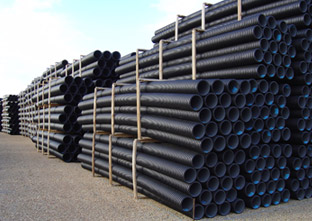
Racking up the successes!
 European industries use approximately one-quarter of all the plastics on the market (47 million tonnes). While packaging manufacturers and building contractors are the biggest consumers, few manufacturers today forego using the tremendous capabilities of plastics in their product designs. To take just one example: the amount of plastics used in motor cars is rising steadily year on year. Polymers make up nearly 20% of a vehicle’s weight now against just 10% 20 years ago. Why the popularity? Simply because these materials have qualities that others do not: they are lightweight, durable, malleable, rot-proof and more. Every year, the plastics industry innovates, bringing out new, ever more surprising polymers. If there is one area where research is particularly active, this is it.
European industries use approximately one-quarter of all the plastics on the market (47 million tonnes). While packaging manufacturers and building contractors are the biggest consumers, few manufacturers today forego using the tremendous capabilities of plastics in their product designs. To take just one example: the amount of plastics used in motor cars is rising steadily year on year. Polymers make up nearly 20% of a vehicle’s weight now against just 10% 20 years ago. Why the popularity? Simply because these materials have qualities that others do not: they are lightweight, durable, malleable, rot-proof and more. Every year, the plastics industry innovates, bringing out new, ever more surprising polymers. If there is one area where research is particularly active, this is it.
Variable service lives
 Happily, the 47 million tonnes of plastic used by the European industry is not destined to go straight to waste. Some plastics, especially those for construction and public works uses, have a service life of several decades. PVC windows, electrical wiring or insulation do not get changed every year...far from it. Packaging, by contrast, has a relatively short service life and does quickly end up as waste. The figures speak for themselves: 40% of plastic waste is packaging waste.
Happily, the 47 million tonnes of plastic used by the European industry is not destined to go straight to waste. Some plastics, especially those for construction and public works uses, have a service life of several decades. PVC windows, electrical wiring or insulation do not get changed every year...far from it. Packaging, by contrast, has a relatively short service life and does quickly end up as waste. The figures speak for themselves: 40% of plastic waste is packaging waste.
End of life or new life?
In Europe, 25 million tonnes of plastics reach their end-of-life every year. But the expression "end-of-life" is misleading because most of these items are undamaged and still have a high intrinsic worth. They can be reused in many ways. Dumping them in landfill makes no industrial or ecological sense. But, today, 40% of these waste materials still end up in landfill. Granted, if properly buried in designated landfill sites they don’t scar the visual landscape, but poorly controlled landfills and fly-tipping are the problem!

What new life?
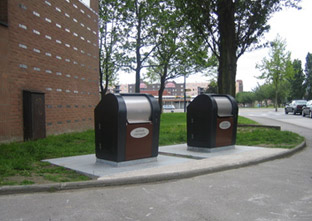 Let's put a few specifics on the matter. The 40% mentioned above is just a European average. Some of the 29 European countries (EU + Norway and Switzerland) do better than others. The Swiss, for instance, recycle nearly 100% of their post-consumer plastics waste compared to just over 10% in Malta. Is it a cultural thing? Is it about governments showing the way? Or, a better appreciation of the issues? It is hard to say, because it is a complex problem that is first and foremost about the end users: industry, but also, and especially, individuals who are much harder to convince and get on-board...;
Let's put a few specifics on the matter. The 40% mentioned above is just a European average. Some of the 29 European countries (EU + Norway and Switzerland) do better than others. The Swiss, for instance, recycle nearly 100% of their post-consumer plastics waste compared to just over 10% in Malta. Is it a cultural thing? Is it about governments showing the way? Or, a better appreciation of the issues? It is hard to say, because it is a complex problem that is first and foremost about the end users: industry, but also, and especially, individuals who are much harder to convince and get on-board...;
Recovery is not necessarily recycling
 When it comes to "life after the bin" of any kind of waste, specialists tend to talk about recovery. But here, we have to distinguish between two kinds of recovery: usable materials recovery and energy recovery. The former is about reusing the so-called used material in producing a new object, while the latter comes down to generating energy from the inherent calorific value of waste. The energy produced can then become heat for district heating and/or electricity. Which is best? There is no hard-and-fast answer for they are closely tied to the economic context and constraints of each nation’s energy needs, but also...people’s mindsets..
When it comes to "life after the bin" of any kind of waste, specialists tend to talk about recovery. But here, we have to distinguish between two kinds of recovery: usable materials recovery and energy recovery. The former is about reusing the so-called used material in producing a new object, while the latter comes down to generating energy from the inherent calorific value of waste. The energy produced can then become heat for district heating and/or electricity. Which is best? There is no hard-and-fast answer for they are closely tied to the economic context and constraints of each nation’s energy needs, but also...people’s mindsets..
New from old!
This is the whole point of recycling or what the professionals call “usable materials recovery.” For the general public, this is the silver bullet: the solution! This is not necessarily how the experts see it with all the data they have at hand to determine the business and environmental case for recycling a particular material. For starters, not everything can be recycled. Some complex materials, often a combination of polymers, cannot be either because no-one has yet come up with a technique or simply because it would be economically unfeasible. These include waxed paper, leaded glass, some treated wood, plastics bonded to other materials, and so on.

A good sort
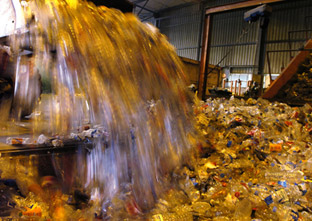 Where plastics are concerned, sorting is a key, highly technical step which involves selectively sorting very different polymers among used objects. Once recovered, the waste is re-sorted, washed, dried and shredded by grinding. Only after all these operations will these materials become capable of reuse. As well as this so-called mechanical recovery, there is another, as yet rarely used, chemical process for recovering plastics whereby the polymers are broken down by chemical treatment to restore the raw materials. Chemical recovery is particularly used for thermoplastics, through heating and the addition of chemical reagents. Needless to say, all these processes require the input of energy and labour, and that comes with a cost and a carbon footprint. These are all things that recycling professionals weigh when it comes to discussing "life after the bin."
Where plastics are concerned, sorting is a key, highly technical step which involves selectively sorting very different polymers among used objects. Once recovered, the waste is re-sorted, washed, dried and shredded by grinding. Only after all these operations will these materials become capable of reuse. As well as this so-called mechanical recovery, there is another, as yet rarely used, chemical process for recovering plastics whereby the polymers are broken down by chemical treatment to restore the raw materials. Chemical recovery is particularly used for thermoplastics, through heating and the addition of chemical reagents. Needless to say, all these processes require the input of energy and labour, and that comes with a cost and a carbon footprint. These are all things that recycling professionals weigh when it comes to discussing "life after the bin."
Chemical recovery: a promising solution?
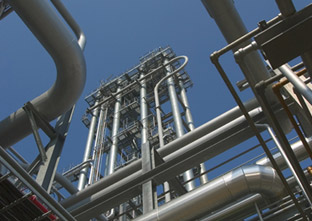 Alchemy is the way forward! But the quest is not to turn lead into gold, but rather end-of-life plastic into oil. So really, taking the material back where it came from ...It is a vision that has tantalised chemists for many years. Most see it as just a slow-news-day story, but now a young American firm may just have come up with the right chemical formula to turn plastic waste into a new source of black gold. It is a closely-guarded secret, but the firm opines that the technology developed could process all types of plastics in any state. The end result would be to convert more than 75% of the starting weight into refinery-ready synthetic crude oil, leaving the rest divided into gas and final waste (under 10%). Just one unit of energy could produce five - a yield ratio of 5 to 1! At current oil prices, the process would already be turning a profit. The big petrochemical groups seem to be looking closely at this new technology. Could we be on the verge of a revolution?
Alchemy is the way forward! But the quest is not to turn lead into gold, but rather end-of-life plastic into oil. So really, taking the material back where it came from ...It is a vision that has tantalised chemists for many years. Most see it as just a slow-news-day story, but now a young American firm may just have come up with the right chemical formula to turn plastic waste into a new source of black gold. It is a closely-guarded secret, but the firm opines that the technology developed could process all types of plastics in any state. The end result would be to convert more than 75% of the starting weight into refinery-ready synthetic crude oil, leaving the rest divided into gas and final waste (under 10%). Just one unit of energy could produce five - a yield ratio of 5 to 1! At current oil prices, the process would already be turning a profit. The big petrochemical groups seem to be looking closely at this new technology. Could we be on the verge of a revolution?
1 kg plastic = 1 litre fuel
Clearly then, although we might be inclined to forget it, recycling is not the only show in town. Incineration is a far better option for some plastic items, not only because they have a very high calorific value but also because recycling is not always financially profitable. If all countries in Europe alone were to try and make better use of energy plastics rather than sending them to landfill, more than one billion barrels of oil could be saved, slashing 80 billion euros off the oil bill. At a time of debt crisis and soaring oil prices, it’s a figure to make one stop and think.
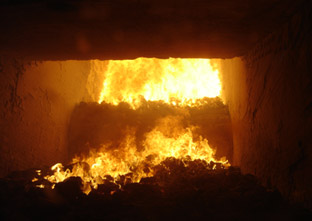
Plastics industry gets its act together
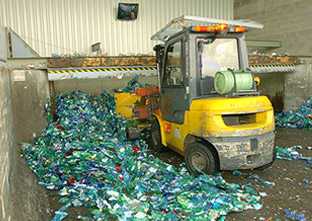 It is a happy fact that in all European countries, the amount of plastic ending up in landfill is steadily declining, despite an increase in post-consumer waste. Plastic manufacturers are now up in arms over landfilling polymers, which they say makes no sense. The plastics industry is mobilising all those involved to move towards zero plastic in landfill by 2020. The consensus is that it is a challenge but like many challenges, it can be met!
It is a happy fact that in all European countries, the amount of plastic ending up in landfill is steadily declining, despite an increase in post-consumer waste. Plastic manufacturers are now up in arms over landfilling polymers, which they say makes no sense. The plastics industry is mobilising all those involved to move towards zero plastic in landfill by 2020. The consensus is that it is a challenge but like many challenges, it can be met!





